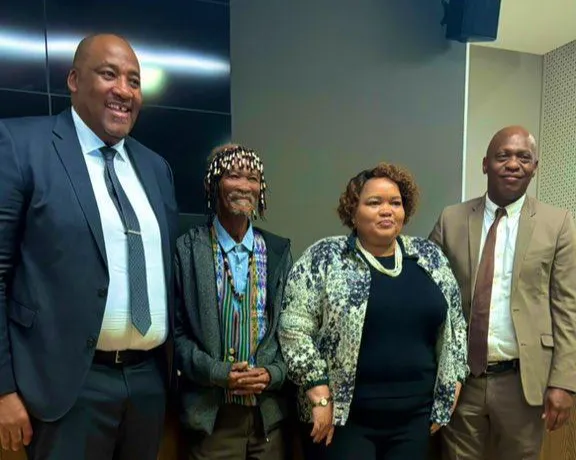Khoi and San ancestral remains to be repatriated and reburied in Northern Cape

Minister of Sport, Arts and Culture, Gayton McKenzie, together with Deputy Minister Peace Mabe, hosted a press briefing on Monday — in collaboration with the Departments of Defence and Military Veterans, and Justice and Constitutional Development — to provide an update on remembrance, restorative justice, and the dignified return of South African ancestors and liberation heroes.
Image: Supplied / Department of Sport, Arts and Culture
THE ANCESTRAL remains of 58 Khoi and San people, as well as South Africans who died in exile during the liberation struggle, will be returned to home soil for reburial as part of an ongoing national repatriation and reburial project.
A spokesperson for the Office of the Minister of Sport, Arts and Culture, Stacey-Lee Khojane, said the process was being carried out in full consultation with affected communities, and was guided by the Northern Cape Reburial Task Team, which represents the Nama, Griqua, Korana, and San communities.
She said the project aimed to restore dignity to those who were “dehumanised” by colonial and apartheid-era practices, particularly through the unethical removal and exploitation of ancestral remains.
“The Department of Sport, Arts and Culture (DSAC), in partnership with the Department of Justice and Constitutional Development (DoJ&CD) and the Department of Defence and Military Veterans (DMV), is leading the Exile Repatriation Project and the Reburial of Khoi and San Ancestral Human Remains,” said Khojane.
“For far too long, the remains of South Africa’s First Peoples, including the Khoi, San and other indigenous groups, were taken without consent and commodified as specimens for exploitation. The remains of these ancestors were collected through grave robbing and illicit trade. Their remains were kept in institutions across the country and abroad under colonial and apartheid rule for decades.”
Khojane added that Iziko Museums of South Africa and the South African Heritage Resources Agency’s Repatriation and Restitution Office would lead the reburial process, which is intended to help heal communities affected by centuries of dispossession.
“In addition, we are engaged in active discussions with the Hunterian Museum at the University of Glasgow regarding the return of more Khoi and San ancestral remains,” she said.
Khojane further noted that many South Africans who went into exile during the liberation struggle died on foreign soil, often unidentified and buried in unmarked or forgotten graves.
“Families were left with unanswered questions and without the opportunity to properly mourn their loved ones.
“The Exile Repatriation Project is a national initiative, carried out in collaboration with the Department of Justice and Constitutional Development, the Department of Defence and Military Veterans and the South African Heritage Resources Agency, that seeks to locate, identify, and repatriate these fallen freedom fighters and return them to their families and communities with the dignity they deserve.”
She said a joint delegation would soon embark on a technical mission to Angola, Lesotho, Zambia, and Zimbabwe to inspect cemetery records, conduct grave mapping, and carry out historical research aimed at locating the final resting places of those who died in exile.
“We urge all former exiles, comrades, family members, and friends to come forward with any information that could assist this important process. This includes names, dates, photographs, locations, or any other relevant details,” Khojane said.
An online form for public submissions is available at www.sahra.org.za/exile-repatriation.
Related Topics: